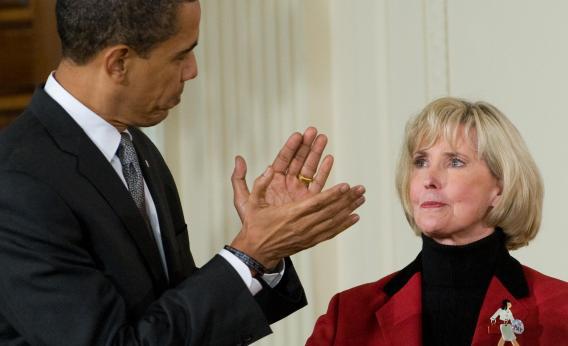Lilly Ledbetter’s Grace and Grit: My Fight for Equal Pay and Fairness at Goodyear and Beyond, is, at its simplest, a coming-of-age story. Published by Random House in February and co-written by Lanier Scott Isom, it is a story of one woman finding her voice. Ledbetter has moments of rebellion and strength throughout—like when she accepts a full-time job despite her husband’s outrage or when she files a sexual harassment complaint with the EEOC—but the bulk of the book reveals a woman who has not yet decided to take a stand. Ledbetter recounts an exhausting litany of discrimination: She was transferred to an inferior department, given an unfair evaluation, threatened, and verbally abused by her co-workers so many times that the reader starts to wonder whether Ledbetter was really as innocent as she paints herself to be. But by the end it becomes clear that she is neither a troublemaker, despite what her co-workers said, nor crazy for staying at Goodyear for 19 years. Like many women who entered the workforce in the late 1960s, Ledbetter was determined to persevere despite her piggish colleagues. How can we blame her for, as she put it, “thinking that if I just worked longer and smarter, my merit would speak for itself.” Just maintaining a full-time job and serving as her family’s main breadwinner was revolutionary enough. She did not need to push the envelope further. She finally decides to go to the EEOC in 1998, for the second time in her career, after finding out that she was making 40 percent less then the other male Goodyear managers who had started the same year she had. At the age of 60, Ledbetter decides to “fight back.” She does not sue Goodyear as a feminist or a liberal or a radical, but as a woman who tried to quietly work within the system but was unfairly challenged every step of the way. At times, the book feels less like a memoir and more like the back-story to her lawsuit and the ultimate passage of the Lilly Ledbetter Fair Pay Restoration Act. But in fact, the trial is when Ledbetter truly comes into her own as a person, as well, transforming from a small-town factory worker into a public figure and the “grandmother of equal pay.” Grace and Grit shows both how far we have come since the 1970s and also how much further we still need to go. Long gone are the days when a married woman would be lectured by the bank teller for wanting to open her own bank account or when a woman would be sent home from work, and the man allowed to stay, after filing a sexual harassment complaint. And yet, as Ledbetter experienced firsthand, women have still not achieved equal pay with men.
Book of the Week: Was Lilly Ledbetter a Troublemaker?

President Barack Obama applauds Lilly Ledbetter before signing the Lilly Ledbetter Fair Pay Act on Jan. 29, 2009.
Photo by SAUL LOEB/AFP/Getty Images
Advertisement